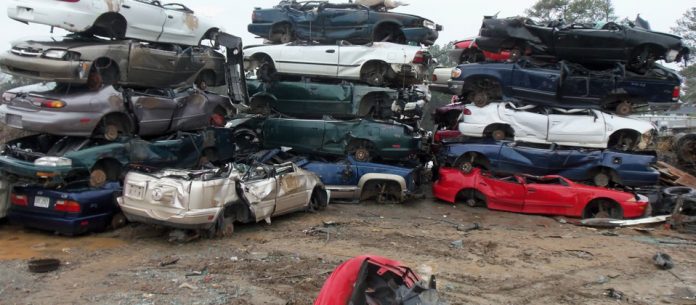Auto recycling is a common practice followed by the developed nations and is becoming increasingly popular in the developing nations as well. With rising concerns over global warming, countries are adopting various schemes to curb pollution by way of auto recycling. In fact, around 80 percent of a car can be recycled. Automobiles are the most recycled consumer product in the world today. Every year, around 30 million cars around the world are recovered for recycling. Over 25 million tons of heterogeneous material is recycled from old vehicles.
India’s automobile industry has ushered in an explosive growth since 2000, with car ownership rising from 127 million to 204 million in 2015. According to an estimated average end of life deadline for a car is 10-15 years National Green Tribunal’s has rights to ban and deregister your car if it supersedes the 15-year mark.
People in India have to follow a proper channel before scrapping and deregistering their old cars. First, they need to issue a letter to the RTO requesting that your vehicle is deregistered and then your car is scrapped to ensure that your vehicle or your registration isn’t used for nefarious or illegal purposes.
To get your car scrapped one must ensure that the scrap dealer is authorized by the government to ensure that the RTO can process your paperwork quickly. The first thing that the scrap dealer is supposed to do will be to remove the chassis number from the vehicle in and hand it over the vehicle owner. Prior to finally scrapping the vehicle, the owner and the scrap dealer can negotiate the best price for the vehicle basis its condition and the quality of its parts.
The vehicle owner is only required to furnish a copy of his registration certificate or photographic certificate to the scrap dealer through this process. photographic evidence is also advisable once the scrapping process is done. Then you have to get the receipt for the scrapping from the scrap dealer and show it to the RTO, who after verification of your documents register your vehicle.
This was the example of our neighbor country India where there is a legal and proper way to scrap your car if it supersedes the mark of 15-20 years. On the other hand, the auto sector of Pakistan has truly benefitted in the last five years, witnessing a phenomenal increase in sales that has invited fresh investments and expansion plans in the industry.
Different international auto players like including Kia, Hyundai and SsangYong Motor Company, French carmaker Renault and Japan’s Nissan have all announced that they would assemble vehicles in the country. Pakistan’s auto industry is rising sharply but sadly unlike India and other countries, there is no such system of car scrapping and recycling. There is no such law introduced by the government and ministry to scrap the old cars as these are the major source of pollutant in the environment. Even today we see the decades-old, poorly conditioned and worn out cars running on the roads of Pakistan.
In fact, some of the cars in Pakistan are imported from Japan and Europe and they need to be scrapped once they complete their suggested age limit.
Similarly, many of these used and old cars emit high levels of pollution, which lead to negative health and environmental impacts linked to climate change and also respiratory conditions caused by breathing in pollution and particulate matter. Older cars are also more likely to fail safety standards and cause accidents.
The government of Pakistan should take a strict step in this regard and introduce a legal system of car scrapping and deregistering to control the environmental hazards and recycle the auto parts and use them to recover steel and other useful products.
by Aqsa Mirza
